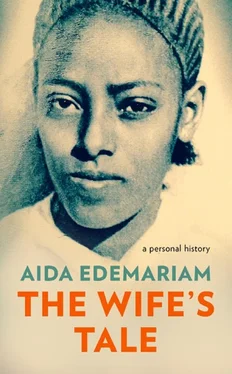1 ...6 7 8 10 11 12 ...16 Ayzosh, ayzosh, he would murmur, drawing her to him. He dipped a hand into a wooden vessel that had held butter from Asmara. When he drew it out it glistened with the remains of the butter, and with it he would wipe away her tears and gently soften her taut and salty face. Ayzosh. I will be like a mother to you.
After one of these moments he seemed to be concentrating on her longer than usual, drawing dark fingers down her neck. They stopped at the centre, traced a spot low on her throat. Are you growing a goitre? he said, almost to himself. She had little idea what a goitre was, so as usual she said nothing, and soon forgot he had asked the question at all.
But some days later a servant came to her to say, that lady the master asked for, she has come. What lady? But she greeted the woman, and watched as the woman set about heating oil-seeds over a low fire, stirring them until they smoked and burned. Watched as she scraped the soot off the sides of the gas lamps and added that to the black residue. A bit of kohl, too, so the mixture glistered and plopped on the heat.
The woman set it aside to cool, then walked over and took her by the hand. ‘Now, sit still.’ She took up a narrow stick, dipped it into the cooling mess, and began to draw a line around Yetemegnu’s neck, parallel to her collarbone. As suddenly as she understood she was on her feet. But the servants held her down as the woman drew another line, and then another and another, and at the ends of the longest, just under her ears, risen suns.
‘Araqi?’ Alcohol would numb her, but she could not assent to any part of this. She shook her head, a sharp snap of refusal. ‘Don’t move!’ She closed her eyes.
When the needle punctured her skin, she exploded, biting and scratching and writhing. But they held her tight, across her body, by her head, so nothing could stir – only her tears, streaming down her face. And her mouth, screaming. What had she done to God to deserve this?
After the scabs had hardened and fallen off, after she had spent two months delirious and burning with infection, she looked and saw she was imprinted with the tracks of her own tears.
In her first pregnancy she slept all the time. They fed her and she accepted it, and they fed her more. And when finally they wrapped her up tight and sent her on slow mule-back to her father’s home in the countryside she felt only relief, to be away from the big house, even though her husband had already left some months before, taking the road south to Addis Ababa as soon as he had heard word the empress was dead.
One morning she felt a trickle down her thighs.
The women gathered, aunts, grandmother, neighbours. None seemed especially concerned, though they did become quite busy. Some raised a dividing curtain across the main room, others began to roast and pound and boil coffee. Charcoal was brought in on a small stand and blown into redness. Incense curled into the rafters. Watchful laughter, and chat.
Yetemegnu, now fourteen, had been told birth would feel something like it did when she went to the grove behind the house at dawn and squatted to relieve herself, so she had thought of it as that painless and that quick. All she could think, as the contractions tightened and tightened their grip, was no, this didn’t feel like that at all. She gasped, and the women’s voices rose to meet her, to share her pain, to distribute it between them.
Mariam Mariam Mariam Mariam Mariam, dirèshilin.
O Lady Lady Lady Lady Lady, come to our aid.
Outside the sun shone on fields vivid with young crops, yellow oil-seed, blue flax, the nodding, dewy greens of new barley, broad beans, wheat. The air, washed bright after months of storms, picked out every tree on the hill that rose behind the house, every silver leaf in the eucalyptus brakes.
But inside it was dark with people and smoke and low talk. In the doorway, behind the curtain, a deacon read from the homilies of Ruphael. Listen, the women said. Listen, because Ruphael opens our wombs.
She sat at the centre, on a low stool. One woman stood behind her, strong arms clasped across her narrow chest. Another sat at her feet. They told stories, asked her questions, tried to divert her, but she sank further and further into herself, dreading the next visitation.
Mariam Mariam Mariam Mariam Mariam, dirèshilin.
O Lady Lady Lady Lady Lady, come to our aid.
They told her she was not meant to cry out, but she couldn’t help it. Oh Mary, mother of God, relieve me! Ayzosh, they said. Ayzosh.
She made wild and breathless promises, about the prayers, the fasting she would undergo if only this could stop. One of the women laughed. Oh, you’ll forget. And you’ll be having another soon enough.
The deacon read on, a baseline whose timbre changed only when he shifted in his seat, or coughed.
Mariam Mariam Mariam Mariam Mariam, dirèshilin.
O Lady Lady Lady Lady Lady, come to our aid.
An endless night, and another day. The women had put down a mattress so she could curl up on her side, but she was now back on the stool. They took turns holding her and drank cup after cup of coffee, but no one ate.
The deacon read on.
Another night, and another day. St Mikael’s Day, bathed in birdsong and sunlight.
Eventually the deacon put Ruphael aside and took another battered book out of its hide case.
‘NOW THERE WAS A CERTAIN CITY WHEREIN A CHURCH HAD BEEN BUILT, AND THE CHURCH WAS BUILT IN THE NAME OF THE ARCHANGEL MIKAEL, AND EACH YEAR, ON THE TWELFTH DAY OF THE MONTH OF HIDAR, WHICH IS THE DAY OF THE ARCHANGEL MIKAEL, GREAT NUMBERS OF THE INHABITANTS OF THE CITY DID NOT FAIL TO VISIT HIS CHURCH – MAY HIS INTERCESSION AND HIS SUPPLICATION KEEP OUR KING DAVID FROM THE EVIL ENEMY!’
The baby crowned. She was beyond pain, beyond comprehension. She felt her spirit departing, the world about her fading. The women’s voices rose.
Mariam Mariam Mariam Mariam Mariam, dirèshilin.
O Lady Lady Lady Lady Lady, come to our aid.
‘AND BEHOLD IT CAME TO PASS ONE DAY WHEN THE PEOPLE WERE JOURNEYING ALONG THE ROAD TO COME TO THAT CHURCH, THAT A MIGHTY ROARING RUSH OF WATERS CAME FROM THE SEA, AND IT BURST UPON THE PEOPLE AND ALARMED AND TERRIFIED THEM EXCEEDINGLY, AND DROVE THEM OUT OF THEIR SENSES; AND THE WATER SURROUNDED THAT PLACE AND ROSE TO THE HEIGHT OF ABOUT TWO MEASURES, AND THE PEOPLE WERE WELLNIGH DROWNED.’
And with a great tearing and an onrush of fluid, the baby arrived, pouring into the arms of the midwife at her feet. She fell back and they caught her and laid her down to rest.
When the placenta had safely followed they took a pat of butter and rubbed the newborn’s head. They pinched its nose, smoothing it, pulling at it, so it would grow long and narrow. And their ililta rose, loud and joyous.
Nine times. A messenger was dispatched to Addis Ababa, to tell Aleqa Tsega his first child was a girl, and that she was named Alemitu.
In her father’s village the feasting began. Araqi and tella flowed like water. Injera arrived by the mesob. Five sheep were slaughtered, and then someone brought four more. All who attended the birth and fasted for the duration ate their fill. But the new mother took nothing at all. They gave her honey, and buttered oatmeal gruel, but she would not touch it. She lay curled on the floor, hugging herself, trying to sleep.
It was only when, decades later, she herself beat through the streets of Addis Ababa in supplication that she began to get an inkling of where her husband had been when Alemitu was born: under a colder sky, walking raw avenues that criss-crossed the bottom of a green bowl surrounded by mountains. The city had been capital for only forty years, and they were still building it. Donkeys trotted through the main streets as they would in any town in the country, carrying firewood, dried discs of cow-dung, baskets for market, but here they also hauled scaffolding, sheets of corrugated iron, drew telegraph poles rattle-bouncing through the dust. Everywhere a new structure was going up, a road being metalled, cable installed, or a ragged work gang being whipped into a semblance of efficiency. Rumours eddied through the thoroughfares: that Tafari was overseeing every detail of the preparations himself; that every day he appeared, a small long-nosed black-caped figure, at a hotel, or the market, or the telegraph office or on the wide sweep of road leading from the railway station, checking on the quality of asphalt or of uniform or of welcome; on the impression his city would make on the foreign guests who had already begun to arrive.
Читать дальше












